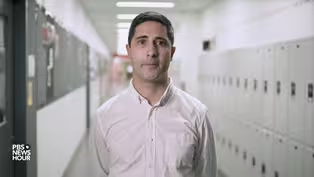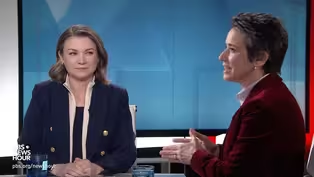
Housing assistance shrinks as prices reach historic highs
Clip: 3/18/2024 | 10m 6sVideo has Closed Captions
Federal housing assistance shrinks as rental prices, homelessness reach historic highs
Unlike other social safety net programs that continue to expand, federal housing assistance has shrunk to its lowest level in nearly 25 years, even as homelessness and rental prices have hit historic highs. Today, only one in four households that are eligible for federal housing assistance actually receive it. Stephanie Sy examines why for our series, America’s Safety Net.
Problems playing video? | Closed Captioning Feedback
Problems playing video? | Closed Captioning Feedback
Major corporate funding for the PBS News Hour is provided by BDO, BNSF, Consumer Cellular, American Cruise Lines, and Raymond James. Funding for the PBS NewsHour Weekend is provided by...

Housing assistance shrinks as prices reach historic highs
Clip: 3/18/2024 | 10m 6sVideo has Closed Captions
Unlike other social safety net programs that continue to expand, federal housing assistance has shrunk to its lowest level in nearly 25 years, even as homelessness and rental prices have hit historic highs. Today, only one in four households that are eligible for federal housing assistance actually receive it. Stephanie Sy examines why for our series, America’s Safety Net.
Problems playing video? | Closed Captioning Feedback
How to Watch PBS News Hour
PBS News Hour is available to stream on pbs.org and the free PBS App, available on iPhone, Apple TV, Android TV, Android smartphones, Amazon Fire TV, Amazon Fire Tablet, Roku, Samsung Smart TV, and Vizio.
Providing Support for PBS.org
Learn Moreabout PBS online sponsorshipGEOFF BENNETT: Unlike other social safety net programs that continue to expand, federal housing assistance has shrunk to its lowest level in nearly 25 years, even as homelessness and rental prices have hit historic highs.
Today, only one in four households eligible to receive federal housing assistance actually does.
Stephanie Sy and producer Mike Fritz take a look at why as part of our ongoing series America's Safety Net.
WOMAN: The rent they are asking, $1,825 a month.
KASSYLI WILLIAMS, Texas Renter: Eight-twenty five?
Oh, that's real good.
LATONYA DONALDSON, Real Estate Agent: Yes.
STEPHANIE SY: In Mesquite, Texas, a suburb of Dallas, 36-year-old Kassyli Williams and her two children need to find a new place to live by the end of the month.
KASSYLI WILLIAMS: I like the outside.
LATONYA DONALDSON: You like the outside?
STEPHANIE SY: But, first, she and real estate agent LaTonya Donaldson have to find a landlord willing to accept the family's housing choice voucher, also known as Section 8.
Housing choice vouchers are the federal government's largest form of rental assistance; 2.3 million American households rely on the $30 billion program.
KASSYLI WILLIAMS: The hardest process is literally the finding process, because you're going through so many different landlords.
So I'm up all night long, all night long trying to find somewhere to stay.
STEPHANIE SY: Williams got on the program in 2010, two years after being hit by a pickup truck on the side of a Dallas highway.
KASSYLI WILLIAMS: I broke the first vertebrae in my neck.
I broke my right shoulder.
My hips were completely crushed, like, literally in pieces.
My pelvis was broken in three places.
STEPHANIE SY: So that led to disability.
KASSYLI WILLIAMS: Disability.
STEPHANIE SY: Lifelong?
KASSYLI WILLIAMS: Lifelong.
There's a lot of cracks and stuff in the ceiling.
STEPHANIE SY: Williams considered herself lucky when she first found this house in Mesquite with her voucher.
KASSYLI WILLIAMS: I have been here seven years, love my landlord, love my house.
But what has happened?
My house has started to fall apart piece by piece.
Literally, every time it rains, the whole thing.
STEPHANIE SY: And does it flood your kitchen?
KASSYLI WILLIAMS: Yes, every single time.
STEPHANIE SY: Now she's back to square one, competing against other renters for a limited supply of houses in Dallas' more desirable suburban neighborhoods.
Along the way, she says she's faced bias from landlords.
KASSYLI WILLIAMS: They automatically assume that you're going to -- because you're on Section 8, that you're dirty or that you're almost not worthy of having a nice house because you need the help.
ANN LOTT, Inclusive Communities Project: Moving is stressful for all of us.
Moving with a Section 8 voucher is overwhelming.
Hello.
This is Ann Lott.
STEPHANIE SY: Ann Lott runs the Inclusive Communities Project, a Texas nonprofit that helps people on housing choice vouchers.
She hears stories like Kassyli Williams' often.
ANN LOTT: As a matter of fact, in the Dallas-Fort Worth Metroplex, 93 percent of the landlords will not take a housing choice voucher.
STEPHANIE SY: A big reason for that, Lott, says is that, in Texas, landlords can legally discriminate against prospective tenants who use voucher income for a portion of their rent.
From what I understand, Black families are disproportionately affected.
ANN LOTT: Approximately 85 percent of the families that we serve that have -- on the voucher program are African American.
But, unfortunately, what we found is that, even with the voucher, the only areas that would accept Section 8 would be those high-minority, high-poverty areas.
STEPHANIE SY: You're speaking in past tense.
Isn't that the case now?
ANN LOTT: That is still the case.
RICHARD NIXON, Former President of the United States: Thank you very much.
STEPHANIE SY: When President Nixon created the Section 8 program as an alternative to government-funded public housing developments, it allowed low-income Americans to take their rental assistance with them, giving them the opportunity to live outside of segregated neighborhoods.
STEFANIE DELUCA, Poverty and Inequality Research Lab Director, Johns Hopkins University: So the idea that families wouldn't be tied to these units and could go purchase housing elsewhere, I think, was an exciting prospect.
STEPHANIE SY: But, 50 years later, the program hasn't lived up to its full promise, says Stefanie DeLuca, director of the Poverty and Inequality Research Lab at Johns Hopkins University.
STEFANIE DELUCA: Most voucher holders in the U.S. live in moderate- to high-poverty neighborhoods.
And, frankly, we have privatized public housing in the U.S. And that means that landlords are our housing providers.
And the program rests on our ability to not only get their participation, but meet their needs as well.
STEPHANIE SY: Across the country, the number of vouchers is determined by annual funding from Congress.
But studies have found that funding hasn't kept up with rental prices.
Another problem is housing supply, says Kevin Corinth with the conservative American Enterprise Institute.
KEVIN CORINTH, American Enterprise Institute: If we can only build, build, build and build some more, that's the only way we have a potential chance of getting families access to these high-opportunity areas that have been demonstrated to have major successful outcomes for themselves and for their kids.
STEPHANIE SY: A lack of affordable housing has led to a surge in homelessness in cities like San Francisco, Los Angeles and New York.
But here in Seattle, one of the nation's least affordable cities, there's a renewed focus on housing vouchers and how to make the system work better for applicants and landlords.
BEN MARITZ, Seattle Landlord: This is one of our studio apartments.
It's about 250 square feet.
STEPHANIE SY: Ben Maritz is a landlord who owns about 900 affordable apartment units in the city.
BEN MARITZ: We have built a lot of housing, especially the kind of kind of -- kind of basic low-frills housing, like what you're seeing here, that is a very good fit for the voucher program.
STEPHANIE SY: Unlike in Dallas, landlords here cannot deny applicants on the basis of their income source.
And Maritz says the Seattle Housing Authority makes it easy to rent to tenants with vouchers.
BEN MARITZ: The downside and the risks aren't that much.
And, frankly, our business does better when we have those kinds of stable rent payments that come from a voucher resident.
They're very easy to work with.
They pay on time.
They pay electronically.
And they have a pretty good case management dispute resolution system.
TySonia McClain with the Seattle Housing Authority says the city tries to address landlords' concerns.
TYSONIA MCCLAIN, Seattle Housing Authority: If a tenant falls behind our rent, they can submit a referral and get assistance with that rent amount.
If the tenant decides to move out and leaves a high utility bill, they can get assistance with that.
If something were to happen and the unit was left damaged, they can receive funds up to $5,000 to repair those damages.
WOMAN: There's total three people in the household, correct?
WOMAN: Yes.
STEPHANIE SY: They also lend a hand to prospective tenants.
McClain leads a team of housing counselors who help connect individuals with potential resources, like help with paying for moving costs, security deposits and application fees.
MAN: Of course, the main way you can always apply is through our online applications process.
STEPHANIE SY: Since January, the Housing Authority has been holding public information sessions for people hoping to get on the waiting list for a housing choice voucher.
It's been seven years since Seattle opened that list to applicants.
TYSONIA MCCLAIN: We get calls every day through our referral line about housing: I'm sleeping in my car.
I'm sleeping in tent city.
I'm sleeping on someone's couch.
STEPHANIE SY: Seattle is hoping to distribute 800 housing choice vouchers by the end of the year, but already 14,000 people have applied.
Whether an individual or family gets one is based largely on luck, says Kevin Corinth, who believes the program should be redesigned.
KEVIN CORINTH: It's essentially a lottery.
Those who are very lucky will get assistance.
Everyone else gets nothing.
Another problem is that it discourages families from earning more.
Basically, your rent effectively goes up if you earn more money, which can discourage upward mobility.
SARAH RICHARDSON, Seattle Renter: So what are you going to get?
GIRL: A maple bar.
STEPHANIE SY: But for those who receive one, like 42-year-old Sarah Richardson, a housing choice voucher can be life-changing.
SARAH RICHARDSON: I don't know where we would be today without the voucher.
STEPHANIE SY: She got one from the Seattle Housing Authority in 2017.
Growing up, Richardson says she battled homelessness and later drug addiction and incarceration.
Having a permanent home helped her turn her life around.
SARAH RICHARDSON: So when I got the news that my number came up on the wait-list, I cried, I screamed.
I was so excited, because I knew that, finally, I was going to feel stable.
STEPHANIE SY: Stability and also opportunities for her 11-year-old daughter, Jabria (ph), that she didn't have.
Their voucher afforded them a house in one of Seattle's better neighborhoods.
Her 21-year-old goddaughter, Aliyah (ph), also lives in the home.
Seattle's commitment to making the process easier was crucial.
What's next?
What are your greatest hopes for the future?
SARAH RICHARDSON: Getting my daughter through middle school and high school.
And that's, like, what my goal is, is to push and help and be the best mom that I can be.
KASSYLI WILLIAMS: Hey, you.
STEPHANIE SY: Back in Texas, Kassyli Williams has the same simple dream.
But when we left them, they were still sending out applications to landlords.
How optimistic are you feeling about this?
KASSYLI WILLIAMS: Honestly, I'm trying to be as positive as I possibly can, even though it's terrifying.
And it's terrifying because you just don't know.
STEPHANIE SY: Last week, after two-and-a-half months of searching, the Williams family finally found a rental and a landlord who will accept their voucher.
For the "PBS NewsHour," I'm Stephanie Sy.
A Brief But Spectacular take on harnessing AI in schools
Video has Closed Captions
Clip: 3/18/2024 | 4m 3s | A Brief But Spectacular take on harnessing AI in schools (4m 3s)
Supreme Court hears 2 cases centered on free speech
Video has Closed Captions
Clip: 3/18/2024 | 5m 21s | Supreme Court hears 2 cases centered on free speech (5m 21s)
Tamara Keith and Amy Walter on Trump's escalating rhetoric
Video has Closed Captions
Clip: 3/18/2024 | 8m 35s | Tamara Keith and Amy Walter on the response to Trump's escalating violent rhetoric (8m 35s)
Trump under fire for dehumanizing anti-immigrant rhetoric
Video has Closed Captions
Clip: 3/18/2024 | 3m 41s | Trump under fire again for violent language and dehumanizing anti-immigrant rhetoric (3m 41s)
What Putin's grip on Russia means Ukraine and the world
Video has Closed Captions
Clip: 3/18/2024 | 15m 5s | What Putin's continued rule in Russia means Ukraine and the world (15m 5s)
Providing Support for PBS.org
Learn Moreabout PBS online sponsorship
- News and Public Affairs

FRONTLINE is investigative journalism that questions, explains and changes our world.

- News and Public Affairs

Amanpour and Company features conversations with leaders and decision makers.












Support for PBS provided by:
Major corporate funding for the PBS News Hour is provided by BDO, BNSF, Consumer Cellular, American Cruise Lines, and Raymond James. Funding for the PBS NewsHour Weekend is provided by...





